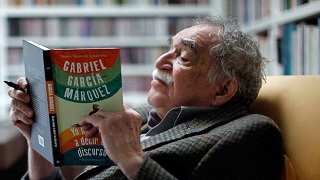De Colombiaanse schrijver Gabriel García Márquez werd op 6 maart 1928 in de kustplaats Aracataca geboren. Zie ook alle tags voor Gabriel García Márquez op dit blog.
Uit: Memories of My Melancholy Whores (Vertaald door Edith Grossman)
“The year I turned ninety, I wanted to give myself the gift of a night of wild love with an adolescent virgin. I thought of Rosa Cabarcas, the owner of an illicit house who would inform her good clients when she had a new girl available. I never succumbed to that or to any of her many other lewd temptations, but she did not believe in the purity of my principles. Morality, too, is a question of time, she would say with a malevolent smile, you’ll see. She was a little younger than I, and I hadn’t heard anything about her for so many years that she very well might have died. But after the first ring I recognized the voice on the phone, and with no preambles I fired at her:
“Today’s the day.”
She sighed: Ah, my sad scholar, you disappear for twenty years and come back only to ask for the impossible. She regained mastery of her art at once and offered me half a dozen delectable options, but all of them, to be frank, were used. I said no, insisting the girl had to be a virgin and available that very night. She asked in alarm: What are you trying to prove? Nothing, I replied, wounded to the core, I know very well what I can and cannot do. Unmoved, she said that scholars may know it all, but they don’t know everything: The only Virgos left in the world are people like you who were born in August. Why didn’t you give me more time? Inspiration gives no warnings, I said. But perhaps it can wait, she said, always more knowledgeable than any man, and she asked for just two days to make a thorough investigation of the market. I replied in all seriousness that in an affair such as this, at my age, each hour is like a year. Then it can’t be done, she said without the slightest doubt, but it doesn’t matter, it’s more exciting this way, what the hell, I’ll call you in an hour.
I don’t have to say it because people can see it from leagues away: I’m ugly, shy, and anachronistic. But by dint of not wanting to be those things I have pretended to be just the opposite. Until today, when I have resolved to tell of my own free will just what I’m like, if only to ease my conscience. I have begun with my unusual call to Rosa Cabarcas because, seen from the vantage point of today, that was the beginning of a new life at an age when most mortals have already died.”

Gabriel García Márquez (Aracataca, 6 maart 1928)

